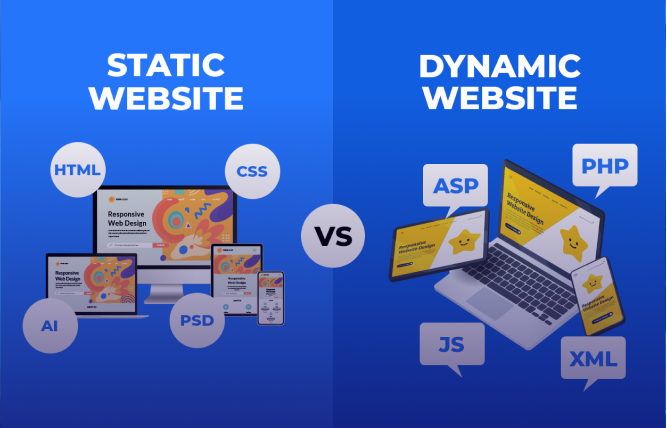Introduction
This blog simplifies the differences between static and dynamic websites, explaining their features, use cases, and which type suits your business. Whether you need a fast, secure static site or a flexible, interactive dynamic one, you will gain complete insights to help you choose the one that fits your needs.
When building a website, you will come across two main types: static vs dynamic. Both serve different purposes, and the right choice depends on what you need your website to do.
In this blog, we’ll break down what makes these two types of websites different, how they work, and when to choose one over the other. We will talk in detail about the types of websites and their use cases.
What is a Static Website?
A static website is simple and straightforward. Each page of the site is fixed, meaning that it doesn’t change unless someone manually updates the content. Static websites are built using basic HTML, CSS, and sometimes JavaScript. They are fast, require fewer resources, and are easier to host on platforms that offer cloud web development or serverless web development options.
Examples of Static Websites
- Portfolio websites – Showcase your work with fixed content pages.
- Landing pages – Single-page sites that focus on a specific product or service.
- Brochure websites – Present simple information about a business or service.
- Event websites – Provide fixed details about events or conferences.
Static Websites Are Best For
Static websites are ideal for industries and businesses that need a simple, fast-loading site without frequent content changes. Here are a few examples of where static websites work best:
- Small Businesses: Local shops or services like plumbers or electricians often use static websites to display contact details, services, and basic information. These sites don’t need regular updates and can provide fast, reliable access to potential customers.
- Artists and Photographers: Creative professionals often use static websites as portfolios to showcase their work. These pages only need to display images and text, making them perfect for fast-loading, visually appealing sites.
- Event Pages: Organisations hosting events like conferences, workshops, or charity events can use static websites to share details about the event, location, and schedule. These websites don’t require constant updates once the information is set.
- Non-Profit Organisations: Charities or advocacy groups that focus on sharing their mission, goals, and past projects often choose static websites for their simplicity and low cost. These sites are perfect for spreading awareness without needing the complexities of dynamic features.
- Landing Pages for Marketing Campaigns: Businesses running specific marketing campaigns often use static landing pages to direct users to a single call to action, like signing up for a newsletter or learning about a product.
Static websites are also easy to host through cloud web development platforms and are cost-effective for businesses that don’t need constant updates. A custom web development company might recommend a static website for businesses prioritising speed, security, and cost efficiency.
Since static websites don’t rely on databases, they’re less vulnerable to cyber threats, making them a secure option for industries like healthcare, legal services, or financial advisors, where data security is critical.
What is a Dynamic Website?
A dynamic website is more complex than a static one. It interacts with a database, allowing content to change automatically based on user actions or updates made by the site owner. Dynamic websites are built using server-side languages like PHP, Python, or ASP.NET, and they often include features like login pages, user profiles, or e-commerce functions. They offer a lot of flexibility and are ideal for businesses or industries that need to provide up-to-date information or personalised user experiences.
Examples of Dynamic Websites
- E-commerce platforms – Sites like Amazon allow users to search for products, add items to a cart, and make purchases.
- Social media websites – Platforms like Facebook or Twitter where users create profiles, post updates, and interact with others.
- Content management systems (CMS) – Websites like WordPress that allow for easy content creation and updates through a backend interface.
- News portals – Sites like CNN or BBC that automatically update with the latest news articles.
- Online learning platforms – Websites like Coursera or Udemy that provide personalised course recommendations based on user preferences.
Dynamic Websites Are Best For
Dynamic websites are well-suited for businesses and industries that need to provide an interactive, personalised experience for their users. Here are some examples:
- E-Commerce Businesses: Online stores, like fashion or electronics retailers, benefit from dynamic websites. They allow users to browse products, view personalised recommendations, and complete purchases. Features like real-time inventory updates are crucial for these businesses.
- News and Media: Media companies often need to update content throughout the day. A dynamic website allows news portals to automatically post new articles, breaking news, and updates in real-time.
- Educational Platforms: Websites offering online courses or training, like universities or corporate training programs, benefit from dynamic websites. They provide personalised course content, track progress, and allow users to interact with course materials.
- Membership-Based Services: Subscription platforms such as streaming services or fitness websites use dynamic websites to provide users with a tailored experience. Users can log in, view their subscriptions, and interact with personalised content.
Dynamic websites are crucial for companies needing website optimisation services to handle large amounts of content and user interaction. Businesses like Joomla development services or WordPress website development providers often build dynamic websites to ensure flexibility and user engagement. Additionally, dynamic websites are essential for companies seeking services from an SEO web development company, as they allow for frequent content updates that can improve search rankings.
Key Differences Between Static and Dynamic Websites
Here’s a detailed comparison table that breaks down a fair comparision between static vs dynamic websites:
| Feature | Static Website | Dynamic Website |
Content Management | Content is fixed and does not change unless manually updated. | Content is dynamically generated and can change based on user interaction or database updates. |
Technology Used | Built using HTML, CSS, and sometimes JavaScript. | Built using server-side languages like PHP, Python, or ASP.NET, and connected to a database. |
Speed | Fast loading since there’s no server-side processing. | Slower compared to static sites due to server-side processing and database queries. |
Hosting Requirements | Simple hosting platforms, including cloud or serverless web development. | Requires more complex hosting that supports server-side languages and databases. |
Cost | More affordable to build and host, with fewer ongoing costs. | More expensive due to the complexity of development and higher hosting costs. |
Security | Highly secure since there’s no database to hack. | More vulnerable due to database usage and the potential for more attack points. |
Content Updates | Requires manual updates for any content changes. | Content can be updated automatically through a CMS or database. |
SEO Capabilities | Basic SEO with fewer content updates is still effective for static information. | Better SEO capabilities as dynamic content updates can be frequent and targeted. |
User Interaction | Limited interactivity (only basic forms or contact details). | Highly interactive, allowing users to log in, make purchases, and interact with content. |
Scalability | Harder to scale, as each page needs to be individually created. | Easier to scale since content is dynamically generated based on templates. |
Examples | Portfolio sites, small business websites, and event landing pages. | E-commerce stores, social media platforms, news portals, membership sites. |
Which Website Type is Right for You?
Choosing between a static vs dynamic website depends on your business needs. If you’re running a small business, showcasing a portfolio, or promoting a one-time event, a static website may be the best option. It’s cost-effective, fast, and secure, perfect for businesses that don’t need frequent updates or user interaction.
However, if your business requires a lot of user engagement, real-time updates, or personalised experiences—like an online store, news website, or subscription service—a dynamic website is likely the better choice. These sites offer more flexibility and can handle the complexity of modern mobile web development and website optimisation services.
For businesses needing a custom web development company, the decision should align with your growth plans and how much you plan to update and interact with your users. Whether you choose static vs dynamic, both can be optimised for speed, security, and SEO.
For Static vs Dynamic Website Consult FuturByte
If you’re still unsure which type of website is right for your business, consult FuturByte. As experts in cloud web development, Joomla development services, and WordPress website development, they can guide you in making the best decision tailored to your business needs.
Conclusion
Choosing between a static and dynamic website comes down to your business goals and the level of functionality you need. Static websites are perfect for businesses that require a simple, fast, and secure site with minimal updates. On the other hand, dynamic websites offer more flexibility and interactivity, ideal for businesses that need regular updates or user engagement. Both options have their advantages, and making the right choice will depend on your specific needs.
At FuturByte, we specialise in custom web development, offering expert guidance in building either static vs dynamic websites. Whether you’re looking for a cloud web development solution, WordPress website development, or Joomla development services, we can help you make an informed decision and build a website that fits your business.
Frequently Asked Questions
The main difference is that static websites display fixed content, while dynamic websites interact with databases to show personalised or frequently updated content.
Static websites are generally faster because they don’t require server-side processing. Dynamic websites may load slower due to database interaction and real-time content generation.
Yes, static websites are more secure since they don’t use databases, which reduces the chances of hacking. Dynamic websites can be more vulnerable due to their reliance on databases.
Businesses that need frequent content updates, user interaction, or personalised experiences, like e-commerce stores or news sites, should opt for a dynamic website.
Yes, you can switch from a static to a dynamic website, but rebuilding the site using server-side languages and databases is required. It’s best to consult with a custom web development company like FuturByte for guidance.
Have questions or feedback?
Get in touch with us and we‘l get back to you and help as soon as we can!



